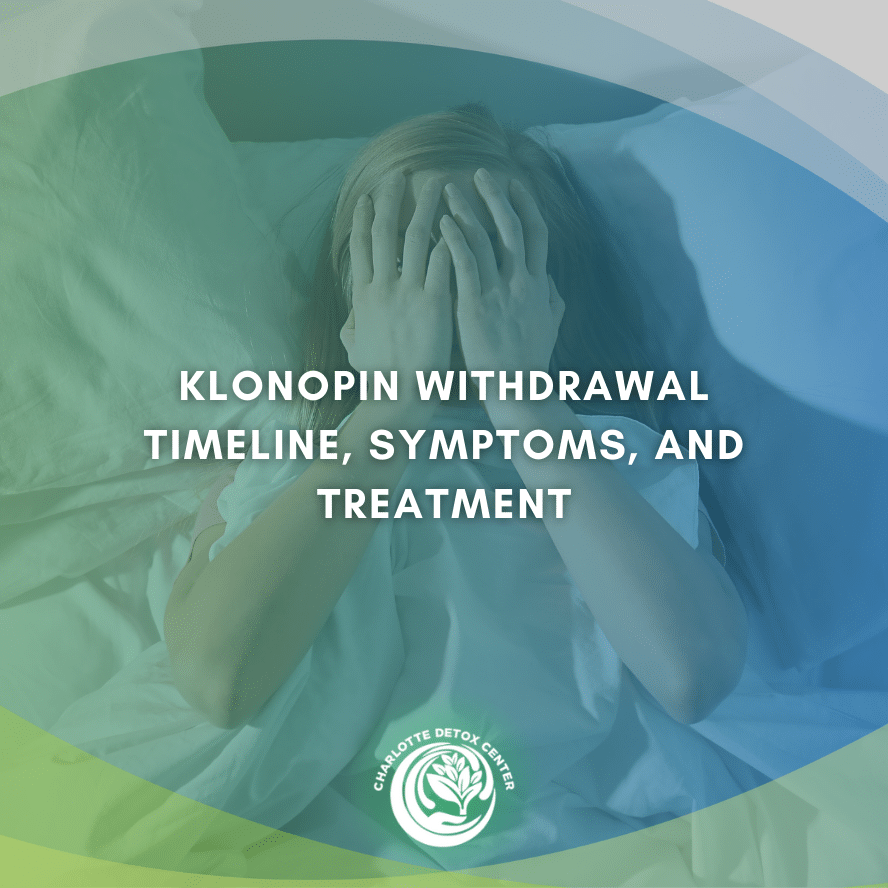Klonopin Withdrawal Timeline, Symptoms, and Treatment

Medically Verified: 2/1/24
Medical Reviewer
Chief Editor

All of the information on this page has been reviewed and verified by a certified addiction professional.
Klonopin is the brand name for clonazepam, a benzodiazepine medication that is primarily prescribed to treat anxiety disorders and insomnia. Because Klonopin is habit-forming, it is only intended for short-term use.
Because of the calming, sedative effects of clonazepam, many individuals abuse this medication. Once someone is dependent on the drug, they will experience symptoms of withdrawal if they attempt to abruptly quit using it. Klonopin withdrawal symptoms can range from mild to severe. Those who are struggling with Klonopin addiction can go to a medical detox center to overcome their withdrawal symptoms in a safe, clinical setting.
The Symptoms of Klonopin Withdrawal
Klonopin is a member of the benzodiazepine class of drugs. These drugs are highly addictive and can cause dependency after only 3 to 4 weeks of use even if the individual is using them as prescribed. Even worse, the symptoms of benzodiazepine withdrawal can be extremely dangerous and potentially life-threatening.
Physical Symptoms
The physical symptoms of Klonopin withdrawal are similar to that of alcohol withdrawal. Oftentimes, people feel like they have the flu. Individuals who used large amounts of clonazepam will experience more severe symptoms of withdrawal.
The physical symptoms of withdrawal may include:
- Hyperventilation
- Insomnia
- Nightmares or waking up during the night
- Muscle spasms
- Loss of appetite and weight loss
- Sweating
- Tremors
- Headaches
- Dizziness and unsteadiness
- Aches and pain in the muscles
- Light sensitivity
- Blurred vision
- Visual disturbances
- Tinnitus (ringing in the ears)
- Grand mal seizures
Mental Symptoms
While the physical symptoms of Klonopin withdrawal are known to be intense, so are the psychological symptoms. Oftentimes, individuals experiencing these symptoms require mental health support and medications to remain stable and safe.
The psychological symptoms of benzodiazepine withdrawal may include:
- Anxiety
- Agitation or irritability
- Insomnia
- Panic attacks
- Nightmares
- Restlessness
- Strange bodily sensations
- Depression
- Perceptual changes
- Issues concentrating
- Having a hard time remembering things
- Delusions
- Confusion
- Hallucinations
- Delirium
- Distorted body image
- Suicidal ideation and behavior
- Feelings of unreality
Rebound and Protracted Withdrawal
If someone was using Klonopin to treat anxiety or insomnia, they may experience rebound symptoms.[1] This means that the anxiety or insomnia that clonazepam was addressing will return, possibly worse than before. Medical detox centers provide patients with medications to address rebound symptoms.
Some people may experience protracted withdrawal which is also known as post-acute withdrawal syndrome. While this does not happen to everyone, the symptoms of protracted withdrawal can persist for months. These symptoms may include anxiety, depression, and agitation.
How Long Does Klonopin Withdrawal Last?
The Klonopin withdrawal timeline can vary from one person to the next based on how long and how often a person takes the drug. An estimated withdrawal timeline is as follows:
Early Stages
The symptoms of withdrawal typically begin 3 to 4 days after the last dose. This is because clonazepam is a long-acting benzodiazepine, meaning it stays in people’s systems longer than other types of drugs. The early symptoms of withdrawal may include agitation, restlessness, stomach aches, and anxiety.
Peak Symptoms
Between 10 to 14 days of withdrawal the symptoms will begin to peak, becoming more intense and requiring more medical attention. The symptoms associated with this stage of withdrawal may include diarrhea, insomnia, nightmares, loss of appetite, tremors, and flu-like symptoms. Without proper treatment, these symptoms could quickly progress to life-threatening grand mal seizures.
Post-Acute Withdrawal
Three weeks after quitting this substance, individuals should begin to feel better and experience lessened withdrawal symptoms. However, some may develop post-acute withdrawal syndrome, causing certain symptoms to persist for months. Without proper treatment, these symptoms could become fatal, making it imperative to attend a professional treatment center.
How is Klonopin Withdrawal Treated?
Benzodiazepine withdrawal can be severe and potentially life-threatening, making professional detox absolutely necessary. During medical detox, patients will be given medications to soothe their symptoms of withdrawal and keep them medically safe throughout the entire process.
Some of the medications used to treat clonazepam withdrawal symptoms include:
- SSRIs like Prozac or Paxil for depression and anxiety
- Anticonvulsants for seizures
- Melatonin for sleep
While many medications can be useful in the treatment of benzodiazepine withdrawal, the tapering method is preferred.[2] The tapering method involves slowly reducing the dosage of clonazepam over some time. This prevents individuals from experiencing the severe symptoms of withdrawal.
Once patients are medically detoxed off of Klonopin, they will begin residential or outpatient addiction treatment. This form of treatment addresses the causes and effects of addiction through the use of evidence-based therapies like cognitive behavioral therapy (CBT). Additionally, group counseling, family therapy, holistic treatments, and 12-step facilitation therapies are commonly used to address Klonopin addiction.
Klonopin Detox Center in Charlotte, North Carolina
Klonopin addiction can lead to severe symptoms of withdrawal, including life-threatening grand mal seizures. If you or a loved one suffer from an addiction to this drug you must go to a drug and alcohol detox center.
Charlotte Detox is a top-rated medical detox program that employs the most qualified doctors, nurses, and additional staff to provide patients with the treatment they deserve. Contact us today for more information on our benzodiazepine detox options.
References:
